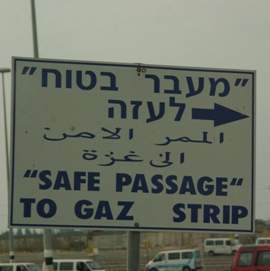Podcast: Play in new window | Download
Host Updates:
- Obama’s Detention Policy Taskforce
- Federal Court Trials / Military Commissions / Preventive Detention
- Holder May Not Prosecute If Torturers Stay Within Yoo Guidelines
Segments This Week:
- Washington DC Check Points: Mara Verheyden-Hilliard
- Jewish Fast For Gaza
——-
Washington DC Check Points Not Legal: Mara Verheyden-Hilliard
Last summer, D.C. police set up checkpoints around the city’s Trinidad neighborhood and denied access to drivers who refused to disclose their destination. The purpose of the checkpoints, according to the Metropolitan Police Department, was to deter violence after a string of drive-by shootings in 2008. Recently, a federal appeals court ruled that these checkpoints are unconstitutional. In the opinion, Chief Judge David Sentelle of the D.C. Circuit Court of Appeals wrote that “citizens have a right to drive upon the public streets of the District of Columbia or any other city absent a constitutionally sound reason for limiting their access.” The Partnership for Civil Justice
- We do think if we had not succeeded with this case, it would have been a model in implementation in urban environments throughout the U.S.
- In the District of Columbia, last summer the mayor and the attorney general deployed an extraordinary checkpoint program. It was really a blockade or barricade program.
- It was the sealing off of an entire neighborhood, police setting up check points and not letting anyone through without being interrogated. It’s an interrogation and seizure program.
- The police would question you, as to where you were going, who you were visiting, demand that you provide identity information, information on your associates, information on what you were doing, who you knew.
- You could not continue to drive on this public roadway unless you proved to the satisfaction of the police, a legitimate reason to travel further. When we challenged them, they stayed in court, they defended the program, saying it was absolutely constitutional.
- Plaintiffs included a 50 year old resident, a retired DC school teacher. He would have to be stopped at the checkpoint to get to his own home. Visitors were reluctant to come over, to avoid getting tangled with the police. Racial profiling, police misconduct, abuse of power.
- It’s not nearly that your stopped by the police and you can explain your way in. The police set up 6 defined categories of legitmate reasons for entering. Visiting a friend is not a legitimate reason.
- If crime became the prevention for fundamental fourth amendment rights, then there wouldn’t be any fourth amendment rights to speak of.
- The issue is you have the right to travel down a public roadway without being seized by the police without any allegation of criminal activity or suspicion of criminal wrong doing.
- The Trinidad neighborhood is on the cusp of gentrification. We’re seeing a lot of these programs happening in areas that are moving toward gentrification.
- The community wants geniune responses to crime in their neighborhoods, this program was not only unconstitutional but ineffective.
- We believe they were collecting information at the checkpoints and collecting a criminal database.
- We demanded that they cease that activity and expunge the information collected in the database.
- They were sending in tag readers, they’re mounting cameras on government vehicles, they do a mass scan on license tags and suck up information on where you are.
Guest – Mara Verheyden-Hilliard is an attorney and co-founder of the Partnership for Civil Justice, which represented three drivers challenging the checkpoints.
—————-
A group of American Rabbis have launched a water-only fast, aimed at breaking the Jewish Community’s silence over Israel’s collective punishment of Palestinians. The initiative, called Jewish Fast For Gaza includes Reform, Reconstructionist, Orthodox and Conservative rabbis who call for lifting the blockade on Gaza. They plan to fast the third Thursday of each month, lasting from sunrise to sunset.
Rabbi Brian Walt:
- This idea of a fast in a time of trouble is an ancient tradition. We were stunned by the silence among the Rabbis.
- So we decided to gather together as a Minyan, to break the silence in our community.
- It’s not a Jewish-only initiative, it’s a Jewish initiated event to draw people of all faiths.
- The state that is the state of the Jewish people is preventing food from reaching children whose growth is stunted by these actions. To be silent in the face of that as a Rabbi, is inconceivable to me.
- Can’t one separate out, an opinion about a government and collective punishment of a whole people?
- Four goals: Lifting Israeli blockade, bring in food, make peace with your enemies.
- Does Israel recognize the Palestinian people?
- Why is Israel asking two things of it’s partner that its not prepared to do?
- It’s a pretext because Israel doesn’t want to negotiate. If Israel doesn’t want to negotiate, they’ll say the other side doesn’t want to, it’s a trick that Israel has done for decades.
- Anyone can join the fast, nearly 600 have joined. 70 Rabbis so far.
- The most vile and violent responses we get come from Israel.
- I grew up under apartheid in South Africa in a very Zionist family with deep connections in Israel.
Guest – Rabbi Brian Walt, co-coordinator of Jewish Fast For Gaza. Rabbi Walt is also the founding executive director of Rabbis for Human Rights-North America and Rabbi Emeritus of Congregation Mishkan Shalom, a synagogue in Philadelphia, PA. He is dedicated to the integration of spiritual life and social justice. Born in Cape Town, South Africa, he was active in the struggle against Apartheid. He is a member of the board of the National Religious Campaign against Torture.
———————————————
